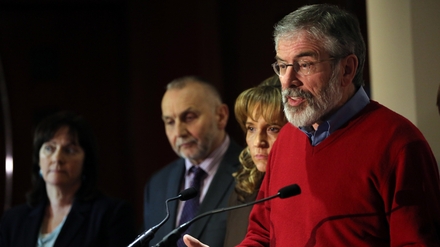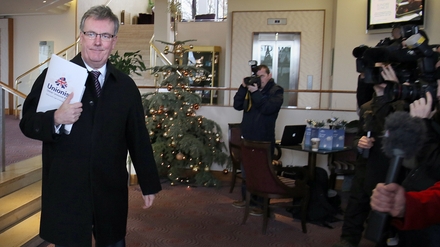Taoiseach Enda Kenny has said the Government stands ready to work with the Stormont Executive and the British government to support further efforts to achieve greater peace in Northern Ireland.
It comes after talks, chaired by former US diplomat Dr Richard Haass, aimed at resolving contentious issues in the Northern Ireland peace process ended without agreement.
Dr Haass and his assistant Professor Meghan O'Sullivan reported progress on some of the issues and urged the parties to work on trying to reach agreement.
Mr Kenny said he hoped the significant effort that had been put into the talks could become the platform for a renewed drive to secure an accord.
Tánaiste Eamon Gilmore described the outcome as not a step back but rather a step not yet taken.
British Prime Minister David Cameron said the talks had identified much common ground that would provide a basis for continued discussions.
The talks were aimed at finding a solution to problems over the flying of flags, parades and dealing with victims of The Troubles.
The last round of negotiations at the Stormont Hotel in Belfast began around 10am yesterday and ended at 5am today.
Sinn Féin and the Social Democratic and Labour Party (SDLP) have signalled a willingness to back Dr Haass's proposals.
But while the Democratic Unionists and Ulster Unionists pledged to take the document back for consultation with their respective party executives, both expressed major concerns about elements of the proposed framework as it stands.
The cross-community Alliance Party said it would endorse the proposals on the past, but rejected the suggested resolutions on flags and parades in their current form.
Northern Ireland Secretary Theresa Villiers said she was disappointed with the outcome, but said it should not be seen as the end of the road.
She said she hoped the parties would continue to work to reach agreement.
After the meeting, Dr Haass said he had not given up hope that a deal would eventually be reached.
Dr Haass said a working group made up of representatives of the five parties in Stormont's power-sharing executive would now be set up to try and find another way to build on "significant progress" that had been achieved.
"Yes it would have been nice to come out here tonight and say we have got all five parties completely signed on to the text, we are not there," Dr Haass said.
The former US diplomat was commissioned by First Minister Peter Robinson and Deputy First Minister Martin McGuinness to chair the six-month process.
Dr Haass said he believed there was a prospect that all the parties would either endorse all, or significant parts of his document in the future.
He urged Mr Robinson and Mr McGuinness to make the details of the final document public so people could make up their own minds.
He denied the process had been a failure.
"Success should not be measured by what we report to you tonight or what the party leaders report tonight - I would ask you to judge the success in six months, in a year, 18 months, in two years, that would give a much more realistic definition or yardstick of what constitutes success," he said.
"What I believe what we have done is laid down solid enough foundations stones."
Parties react to proposals
Sinn Féin President Gerry Adams signalled his party's willingness to strike a full deal and said he would be urging the party's executive to endorse it.
He said the proposals presented by Dr Haass represented a "compromise position" and provided the basis for agreement.
Mr Adams insisted talks could not continue forever and at some point parties had to "call it".
He said if there was no progress from this point, he would be seeking an urgent meeting with the British and Irish governments to call for the production of a road map towards resolution.
DUP negotiator Jeffrey Donaldson said progress had been made, but that a number of difficulties remained.
"We do not have an agreement this evening, but we are committed to continuing this work beyond now in dialogue with others to try and resolve the outstanding issues that need to be addressed," he said.
"We owe that to the people of Northern Ireland, especially to the innocent victims of terrorism who have suffered so much over the decades."
Unionists have indicated concerns with some of the language used and claim too much focus has been placed on killings perpetrated by state forces.
UUP leader Mike Nesbitt said he had an opinion on the document, but would not make it public until his party had the chance to examine the proposals.

"We will have an honest debate and hopefully form a final opinion at the end of that debate," he said.
SDLP leader Alasdair McDonnell said "bigger and better solutions" were needed on some aspects, but said he would be recommending that his party give a general endorsement to what had been proposed.
"I am recommending general endorsement because of the strengths in the Haass/O'Sullivan proposals, most in evidence on how to deal with the past," he said.
"I have always said that the first test of progress must be comprehensive proposals to address the past. That is the biggest strength of Haass/O'Sullivan."
Alliance Party deputy leader Naomi Long criticised proposals on parades and flags, but she also said great work had been done on the issue of the past.
"We have seen a huge sea change in the level of political agreement which has exceeded public expectation, particularly in delivering for the victims and the reconciliation process," said the East Belfast MP.
Proposals put forward by Haass
There was little or no progress made on flags, with instead a proposal to set up a commission to examine the issues over a longer term.
It is understood the final document also proposes the replacement of the government-appointed Parades Commission with another set of structures to adjudicate on contentious marches.
The text also envisaged a new mechanism to oversee dealing with the legacy of the past. A truth recovery body would potentially offer limited immunity from prosecution to those who co-operate.
Dr Haass and Dr O'Sullivan, a US foreign affairs expert, said their role in any future political process would be limited, but both insisted they were not washing their hands of the process.
The Haass process was set up in July to deal with what have become three of the primary obstacles to meaningful reconciliation in Northern Ireland.
Dr Haass aimed to strike a deal before Christmas, but had to return to the US on Christmas Eve empty-handed after a marathon session of all-night negotiations last week.
Cutting short his seasonal break, he returned to Belfast on Saturday in a last-ditch attempt to secure agreement.
Anda sedang membaca artikel tentang
NI parties urged to continue negotiations
Dengan url
http://newsdeadlineup.blogspot.com/2013/12/ni-parties-urged-to-continue.html
Anda boleh menyebar luaskannya atau mengcopy paste-nya
NI parties urged to continue negotiations
namun jangan lupa untuk meletakkan link
NI parties urged to continue negotiations
sebagai sumbernya
0 komentar:
Posting Komentar